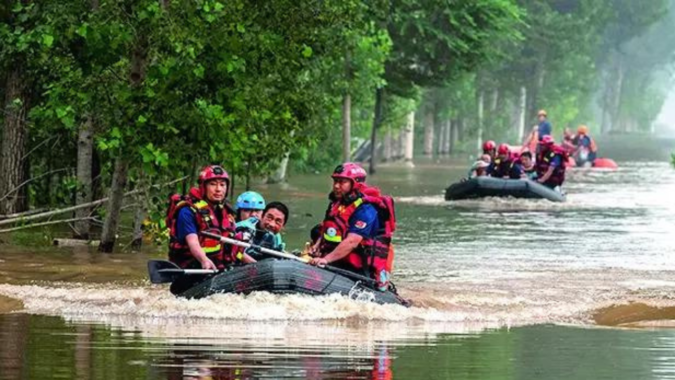Officials in Hebei Province, which borders Beijing, had opened flood gates and spillways in seven low-lying flood control zones to prevent rivers and reservoirs from overflowing in Beijing and the region’s other metropolis, Tianjin, state media said. The Communist Party leader of Hebei, Ni Yuefeng, said he ordered the “activation of flood storage and diversion areas in an orderly manner, so as to reduce the pressure on Beijing’s flood control and resolutely build a ‘moat’ for the capital.”
That move further inundated the adjacent city of Zhuozhou in Hebei, which had already been struggling to contain its own floods after a levee broke and a local river overflowed. Its streets and neighbourhoods turned into a brown, muddy lake, with water up to 23 feet deep destroying homes and businesses.
The crisis in Zhuozhou has set off widespread anger, because help was initially slow to arrive in some areas, leaving many stranded. Survivors have also complained they were not given ample warning about the discharge of waters, and questioned if they would be compensated for their losses.
In particular, people have denounced what they perceive as a Hebei leadership that has been more interested in appeasing national leaders in Beijing than in safeguarding millions of Chinese citizens. Ni’s “moat” comment, seemingly insensitive to the losses endured by his residents, became a hashtag that quickly amassed over 60 million views before censors began suppressing the online discussion. “To protect Beijing, no one cares if we in Hebei are being flooded,” a resident of a village on Zhuozhou’s outskirts complained on Friday morning.
Another Zhuozhou resident stood at the edge of a field next to his partly submerged village on the city’s outskirts on Friday, waiting for lingering, thigh-deep water to subside. He said he had put his belongings on chairs and chairs up on beds before fleeing his house as the waters rose.
The government and party have set aside at least $20 million for flood prevention, relief and reconstruction efforts in Beijing and Hebei; another $63 million was allocated on Friday to Beijing, Tianjin and Hebei for the restoration of dams, reservoirs and other water facilities. Zhuozhou’s government issued a national appeal on Thursday for donations of money and relief supplies.
But the flooding extended beyond designated diversion areas, which could complicate compensation. And many living in Zhuozhou are migrants from other provinces who lack legal residency in Hebei.
